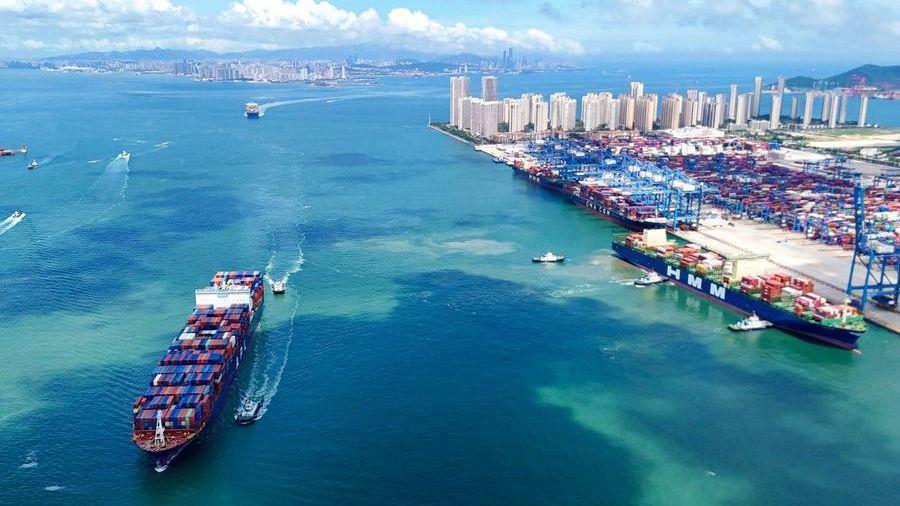This aerial drone photo taken on July 8, 2025 shows container ships entering Qingdao Port in Qingdao, east China's Shandong Province. (Photo by Zhang Jingang/Xinhua)
The International Monetary Fund has upgraded China's growth forecast in 2025, citing stronger-than-expected economic data in the first half of the year and mutual reduction in U.S.-China tariffs in May.
by Xinhua writers Xiong Maoling, Hu Yousong
WASHINGTON, Aug. 27 (Xinhua) -- An International Monetary Fund (IMF) official applauded China's strong-than-expected economic data in the first half of the year and targeted fiscal policies including efforts to boost consumption.
According to the latest update to World Economic Outlook (WEO), the IMF has upgraded China's growth forecast in 2025, citing stronger-than-expected economic data in the first half of the year and mutual reduction in U.S.-China tariffs in May.
"One (factor) is stronger than expected incoming data during the first half of the year. And the second factor is reduced U.S.-China tariffs relative to what was assumed during the April forecast round, given the fact that tariffs were reduced by both countries on each other in May," said Sonali Jain-Chandra, IMF Mission Chief for China, told Xinhua in an interview.
China's manufacturing sector has also shown strong performance, driven by high-tech industries like automobiles and electrical machinery, which have seen double-digit growth in 2025, Jain-Chandra added.
For the latest WEO projections, however, the IMF cautioned that ongoing trade uncertainty remains one of the main downside risks to the global economy.
An aerial drone photo shows the container terminal of Lianyungang Port in east China's Jiangsu Province, Jan. 3, 2025. (Photo by Wang Chun/Xinhua)
World export growth, she said, could ease later on in the year, as concerns about future tariffs led to a strong surge in exports in the first half of the year.
In the current environment of mounting trade tensions, countries should seek to reduce policy-induced uncertainty by promoting clear and transparent trade frameworks, the IMF official said.
"This entails the pursuit of multilateral initiatives on global commons, as well as modernizing trade rules where feasible, and seeking plurilateral or regional solutions on other matters," she said.
In this context, Jain-Chandra is looking forward to further strengthening of trade relations between China and its Asian neighbors.
"I think this would be the continuation of the trends that have already taken place over the past few years, notably with important progress being made on negotiations and upgrading the China-ASEAN free trade agreement," she said.
Jain-Chandra also lauded the effort of the Chinese authorities to boost consumption.
"Some of the measures in the budget, such as expanded trade-in program, I think is one example, as well as efforts to have local governments clear arrears, I think these are factors behind the relatively resilient private consumption that we have seen in the first half of the year," said Jain-Chandra.
"There's also been recent measures, actually ... on the provision of child care subsidies. We think this is also very welcome," she said.
"We think that strengthening social protection further beyond these measures ... would be important," said Jain-Chandra, noting that changes are already happening in that direction.




 A single purchase
A single purchase









